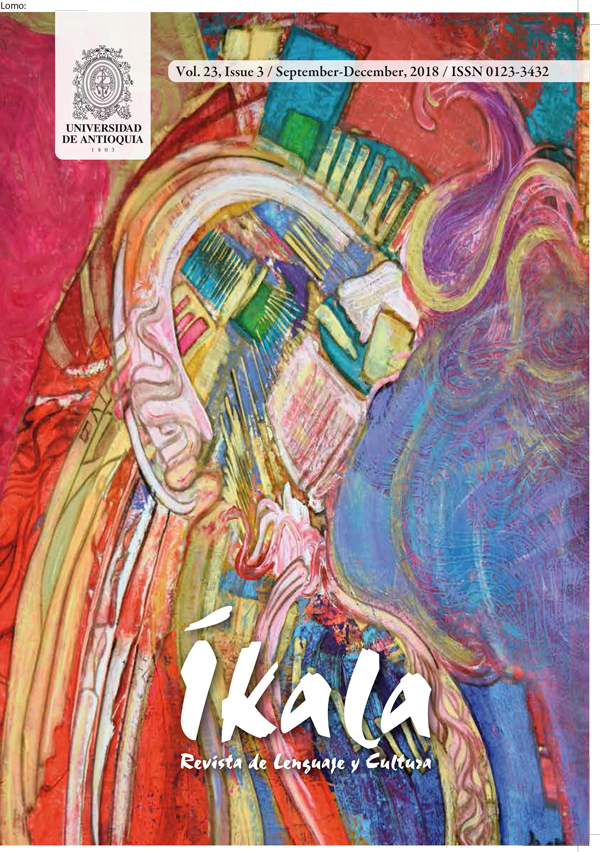Formules D'adresse (Tutoiement et Vouvoiement) dans L'espagnol de Guinée Equatoriale: Une Etude Basée Sur L'oeuvre de Juan Tomás Avila Laurel
DOI :
https://doi.org/10.17533/udea.ikala.v23n03a09Mots-clés :
formules d’adresse, espagnol de Guinée Equatoriale, Juan Tomás de Ávila LaurelRésumé
Les formules d’adresse présentent aussi bien une configuration qu’une distribution très complexes dans le paysage hispanophone en général. Cependant, comme c’est le cas dans la plupart des questions de notre discipline, les étudessont généralement limitées à l’espagnol péninsulaire et hispano-américain. Ainsi donc, cet article vise à analyser la question des formules de traitement dans un autre espace qui présente des caractéristiques spécifiques, à savoir la Guinée Equatoriale, seul pays hispanophone de l’Afrique subsaharienne. Pour ce faire, à partir d’une approche méthodologique inductive, la réflexion est basée sur un corpus multiple, un conte et deux romans de l’écrivain guinéen Juan Tomás Ávila Laurel, pour mettre en évidence le chevauchement des distributions, qui place l’espagnol de la Guinée équatoriale en dehors de l’hispanophonie voseante d’une part, et indécise dans la distribution objective et systématique entre le tutoiement et le vouvoiement (tu /vous/vous) tel que cela se présente en Espagne, d’autre part. L’hypothèse principale semble être l’absence dans les langues locales d’un pronom personnel (deuxième personne, avec une forme verbale correspondante) pour servir d’équivalent du vous péninsulaire. Un reflet interférentiel des relations proxémiques telles que structurées dans les langues et les cultures locales qui transparaît dans la langue espagnole en terre africaine.
Téléchargements
Références
Ambadiang, T. (2010). Escrituras intersticiales y dinámicas de la alteridad: el “problema” de la lengua en la literatura negroafricana escrita en español. En L. Miampika y P. Arroyo (Eds.), De Guinea Ecuatorial a las literaturas hispanoafricanas (pp. 41-64). Madrid: Verbum.
Ávila Laurel, J. T. (2002a). Nadie tiene buena fama en este país. Ávila: Malamba.
Ávila Laurel, J. T. (2002b). Rusia se va a Asamse. Ávila: Malamba.
Ávila Laurel, J. T. (2009). Arde el monte de noche. Madrid: Calambur.
Bolekia Bolekà, J. (2001). Lenguas y poder en África. Madrid: Mundo Negro.
Bolekia Bolekà, J. (2011). Estado y poder en Guinea Ecuatorial. Recuperado de http://www.angelfire.com/sk2/guineaecuatorial/poder.htm.
Carricaburo, N. (1997). Las fórmulas de tratamiento en el español actual. Madrid: Cuadernos de lengua española.
Casalmiglia, H. y Tusón, A. (2012). Las cosas del decir. Manual de análisis del discurso. Barcelona: Ariel.
González Echegaray, C. (1951). Notas sobre el español en África ecuatorial. Revista de Filología Española, 35, pp. 106-108.
Iribarren, M. C. (2009). Fonética y fonología españolas. Madrid: Síntesis.
Laínez, J. C. (1999, mayo de). Narrativa popular guineoecuariana: Rusia se va a Asamse, de Juan Tomás Ávila Laurel. El Patio. La Revista de la cultura hispano-guineana, (63), 61-64. Recuperado de http://bibliotecadigital.aecid.es/bibliodig/pub_aecid/es/catalogo_imagenes/grupo.cmd?path=1015315
Lapesa, R. (1981). Historia de la lengua española. Madrid: Gredos.
Liniger-Goumaz, M. (2013). Guinée Équatoriale. Un demi-siècle de terreur et de pillage. París: L’Harmattan.
Lipski J. (s. f.). Las lenguas criollas (afro)ibéricas: estado de la cuestión. Recuperado de http://www.csub.edu/~tfernandez_ulloa/hle/lipski-lenguas%20criollas%20afroibericas.pdf.
Muakuku Rondo Icambo, Fernando (2006). Conflictos étnicos y gobernabilidad: Guinea Ecuatorial. Barcelona: Ed. Carena.
Ndongo Esono, S. (1956). Gramática pamue. Madrid: Instituto de Estudios Africanos, Consejo Superior de Investigaciones Científicas.
Nguendjo, I. (2014). Contactos lingüísticos afrohispanobantúes. Reflexiones varias (1). Saarbrucken: Editorial Académica Española.
Nsue Angüe, M. (1985). Ekomo. Madrid: UNED.
Quilis, A. y Casado-Fresnillo, C. (1995). La lengua española en Guinea Ecuatorial. Madrid: UNED.
Rona, J. P. (1967). Geografía y morfología del voseo. Porto Alegre: Pontifica Universidad Católica.
Yakpo, K. (2009). Gramática del pichí. Barcelona: CEIBA y Centros Culturales Españoles de Guinea Ecuatorial.
Téléchargements
Publié-e
Comment citer
Numéro
Rubrique
Licence
(c) Tous droits réservés Íkala 2018

Cette œuvre est sous licence Creative Commons Attribution - Pas d'Utilisation Commerciale - Partage dans les Mêmes Conditions 4.0 International.












